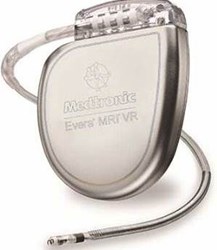Medtronic Wins FDA Clearance For First MRI-Safe ICD
By Jof Enriquez,
Follow me on Twitter @jofenriq

Medtronic announced that it has gained U.S. Food and Drug Administration (FDA) approval for the first-ever implantable cardioverter defibrillator (ICD) device that can be safely used by patients undergoing full-body magnetic resonance imaging (MRI) scans.
In a statement, Medtronic said its Evera MRI SureScan ICD System is now approved for MRI scans on any part of the body without positioning restrictions. The system is designated MR-conditional, which means the ICD must be paired with compatible Sprint Quattro Secure MRI SureScan DF4 leads. Both are available starting this month. The system gained CE Mark (Conformité Européene) designation in April last year.
Until now, FDA has contraindicated the use of MRIs in patients with ICDs because MRI scanners potentially can cause the implants to malfunction or fail to deliver life-saving shocks to correct lethal arrhythmias.
FDA's approval was based on Medtronic's Evera MRI Clinical Trial, which enrolled 275 patients at 42 centers around the world, who were implanted with the Evera MRI ICD. The study met the safety endpoint with no complications. Also, results showed MRI scanning did not have any impact on the device's sensing, detection, or therapy delivery in patients who experienced arrhythmias post-MRI.
Medtronic said it has implemented hardware and software design changes to the Evera MRI Secure Scan system from previous generation devices that differentiate it from other ICDs and allow the device to undergo full-body MRIs without loss of function.
"The Evera MRI ICD system underwent comprehensive computer modeling of more than 2.3 million clinical scenarios and this information, combined with the safety data from the clinical trial, has resulted in this critical regulatory approval," said Marshall Stanton, M.D., VP and GM of the Tachycardia business, which is part of the Cardiac Rhythm and Heart Failure division at Medtronic, in the statement.
According to Medtronic, the first-ever MRI-safe ICD addresses a critical unmet need of patients who are at risk for sudden cardiac arrest (SCA), but need to undergo MRI scans due to other medical reasons. Medtronic stated that up to 36 percent of patients with ICDs would likely need an MRI within four years of device implantation.
"Patients at risk for sudden cardiac arrest have long relied on ICDs to monitor their hearts, detect dangerous arrhythmias and deliver the life-saving therapy needed to survive," said Michael R. Gold, M.D., Ph.D., chief of cardiology and Michael E. Assey Professor of Medicine at the Medical University of South Carolina, as well as principal investigator in the Evera MRI Clinical Trial, in the statement. "Many of these patients also need access to MRIs, so the approval of an ICD that can be used in an MRI environment is crucial, and can help provide patients with the peace of mind that they are receiving the best care available."
MRI-safe pacemakers have been available for years, but it has taken longer for manufacturers to develop MRI-safe ICDs because of the devices' more complex design and function. FDA has been encouraging companies to hasten the development of MRI-compatible devices as more MRI scans are utilized for diagnosing myriad diseases.
"With MRIs becoming way more prominent, becoming the preferred mode of imaging for certain kinds of disease...more and more device makers are concentrating on trying to make things that are MRI compatible," said Dr. David Steinhaus, the medical director of Medtronic's cardiac rhythm and heart failure business, to CNBC.
A second-MRI compatible ICD, which is not yet FDA-approved, has been tested by Germany-based Biotronik through the ProMRI study, Medscape reports.
